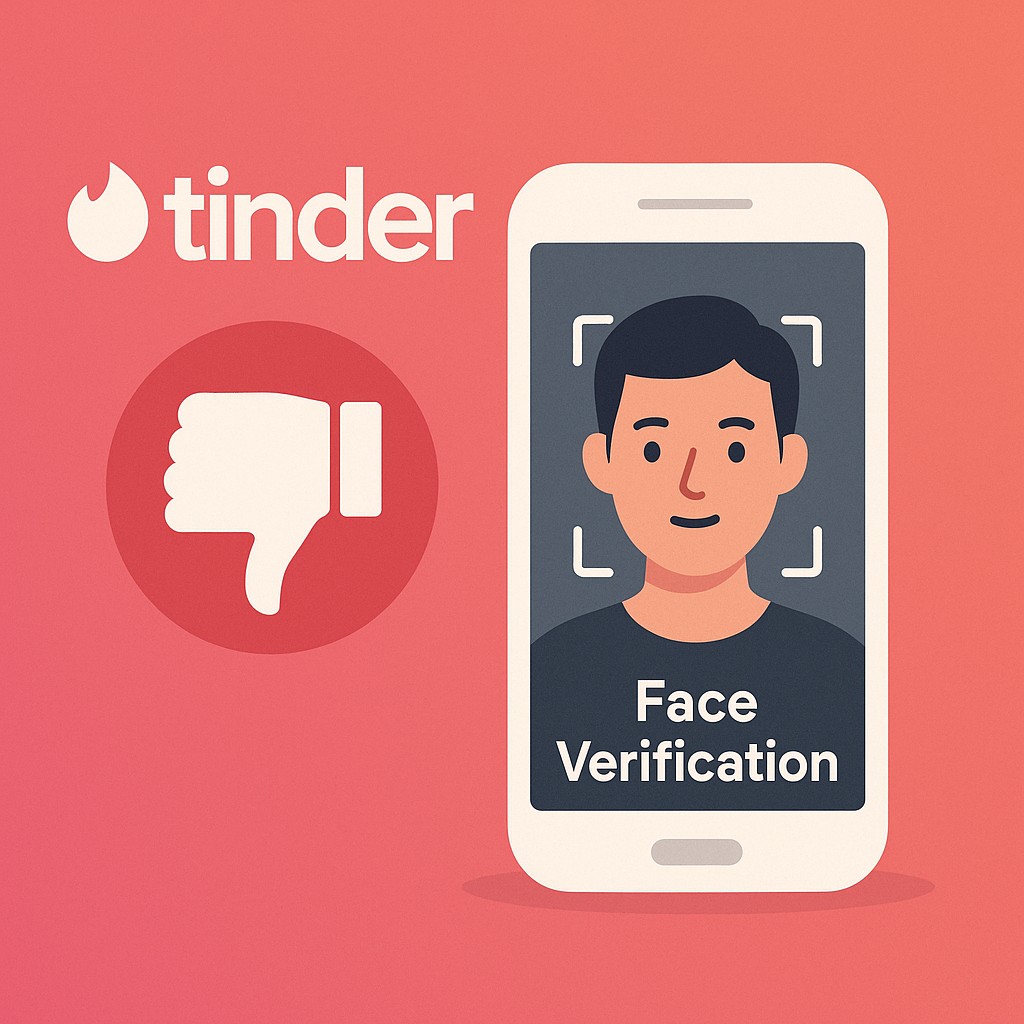Tinder, the renowned dating app owned by Match Group, recently introduced a mandatory facial recognition feature called Face Check for new users in California, starting June 2025. Reported initially by Axios, this move aims to reduce impersonation, enhance authenticity, and address ongoing safety concerns. While Tinder claims this promotes a “fun and respectful environment,” privacy-conscious users have valid concerns about biometric data use.
This article will explore Tinder’s Face Check feature, discuss associated privacy risks, clarify California’s legal framework, and suggest safer alternatives like MobileSMS.io to help you maintain your digital privacy.
Understanding Tinder’s Face Check Feature
How It Works
Face Check requires California users to submit a short video selfie. Powered by FaceTec, it verifies:
- Liveness: Ensuring users are real and present.
- Profile Photo Matching: Confirming the selfie matches uploaded profile photos.
- Duplicate Detection: Preventing impersonation or catfishing by identifying duplicate accounts.
Upon successful verification, users receive a “verified” badge. Tinder deletes the video selfie immediately, but stores a non-reversible encrypted facial map throughout the user’s account life, deleting it within 30 days upon account closure.
Context and Purpose
Face Check has already shown success in Canada and Colombia, significantly reducing fake profiles. Match Group’s head of trust and safety, Yoel Roth, explains that California’s strict privacy laws and diverse demographics made it ideal for further testing. Competitors like Bumble have implemented similar measures, but Tinder’s mandatory use sets a concerning precedent.
Top 5 Privacy Risks of Tinder Face Check
1. Biometric Data Vulnerability
Biometric data cannot be changed like passwords or credit card numbers. Dating apps are prime targets for cybercriminals, with past breaches impacting millions (IT Brew, 2023). Despite encryption, the long-term storage of face maps poses significant security risks.
2. Consent and Transparency Issues
Mandatory biometric verification raises ethical concerns. Advocacy groups like S.T.O.P. warn it normalizes surveillance and could enable misuse by abusers or stalkers. Users may feel forced into sharing sensitive data without fully understanding privacy implications.
3. Accuracy and Bias Concerns
Facial recognition technologies frequently exhibit biases, performing poorly for darker-skinned users, women, and certain age groups (GAO). This could unjustly exclude or misidentify genuine users, further complicating fairness and privacy.
4. Potential for Misuse
Mozilla Foundation researchers express concerns over facial data collection without explicit consent. Despite Tinder’s assurances, broader industry data practices heighten user distrust about how biometric data might be leveraged.
5. Chilling Effect on User Behavior
Knowing biometric data is collected can discourage openness, altering authentic user behavior and hindering genuine connections—a critical concern for dating apps like Tinder.
California’s Legal Protections
California’s robust privacy regulations (CCPA and CPRA) classify biometric data as personal information, providing users:
- Right to Know data collected.
- Right to Delete data after account closure.
- Right to Opt-Out of data sales or sharing.
However, the mandatory nature of Face Check still leaves users uneasy, despite compliance with these legal standards.
Safer Privacy-Friendly Alternatives to Tinder Face Check
MobileSMS.io: Enhanced Privacy Without Biometrics
MobileSMS.io offers a safer solution, providing real, Non-VoIP numbers for verification, ensuring users maintain privacy without biometric data collection.
Benefits include:
- Enhanced security with Non-VoIP numbers.
- Flexible options: One-Time Use Numbers or Long-Term Rentals.
- Highly recommended: the 30-Day Rental for All Services provides a dedicated, reusable number ideal for dating apps like Tinder, Bumble, and others, ensuring maximum privacy and convenience.
Explore long-term number rentals
Step-by-Step: Verifying Tinder Using MobileSMS.io
- Visit MobileSMS.io and create your account.
- Top-up credits through secure methods (cards, crypto, etc.).
- Select USA (or another preferred country) for your number.
- Choose Tinder from the platform list.
- Use your provided Non-VoIP number to verify your Tinder account.
This straightforward process ensures complete privacy and eliminates biometric risks.
Alternative Privacy-Friendly Dating Apps
For users preferring to avoid facial recognition entirely:
- Lex: Text-based, ideal for anonymity and LGBTQ+ community.
- Pure: Anonymity-focused, ID-based verification without facial data.
- eHarmony and Happn: Better privacy practices with optional verification.
- Taffy: Blurred photos until interaction, emphasizing privacy.
FAQ
Q: Is Tinder Face Check mandatory in California?
A: Yes, mandatory for new California users.
Q: How safe is my facial data with Tinder?
A: Tinder encrypts facial maps, but long-term storage poses privacy risks.
Q: How soon does Tinder delete biometric data?
A: Within 30 days after account closure.
Q: Can I bypass Face Check in California?
A: New users currently cannot avoid it; existing users might delay verification.
Q: Why prefer MobileSMS.io over facial recognition?
A: It offers private, secure verification without biometric data concerns.
Q: Are alternatives like Lex or Pure safer?
A: Yes, these apps prioritize privacy and avoid mandatory facial recognition.
Conclusion
Tinder’s Face Check feature addresses important security concerns but introduces substantial privacy risks. Users must balance the convenience of verification against privacy and data security.
Opting for secure verification solutions like MobileSMS.io or privacy-focused dating apps can help maintain your privacy and ensure safer digital experiences.

